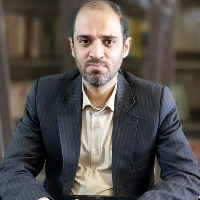The Semantics of the Word "Azab" and Its Combinations in the Holy Quran Based on Syntagmatic Relations
Semantics is a branch of linguistics that plays an important role in understanding the Holy Quran. Because by examining the words in the context of the verses, you can get the exact meaning of the word. The concept of "Azab" (=torment) is one of the most frequent concepts in the Holy Qur'an, which alone is the natural result of a person's action and does not imply severity; but its combination in additional combinations with words such as: "Hariq", "Sa'ir", "Hamim" etc. expresses its state and intensity. The authors intend to answer this important question, what effect do the additional combinations of the word torment have on the meaning and interpretation of this word based on the syntagmatic relations? The structure of the verses of "Azab" in additional combinations shows the influence of these concepts on the word "Azab" and the limits of this word along with its various additional layers; For example, the torment of Hamim indicates the torment with boiling water at highest temperature. The torment of Sa'ir indicates the torment of a fire that has a long and burning tongue, that's why the fire in wood is not called Sa'ir because it does not have these conditions. Most of the verses of torment in its additional combinations are related to doomsday and only in four verses it refers to our world. and in most of the verses, the severity of the torment is indicated by the words Akbar, Abqa, Ashad, Ashqa and Akhza, which shows that this torment is greater and more severe than the worldly one. This research analyzes the relationship of the word "Azab" with other accompanying concepts in additional combinations with a descriptive-analytical method in order to determine the effect of these combinations on the word "Azab".
-
Solutions to increase the insight of Faraja employees in the scientific field
*, Forough Farahmand Harami, Syyed Sajjad Jafari
Journal of maritime police security, -
A Study of the Linguistic features of Rousha Dakhaz’s The Remnants based on Roman Jakobson’s Linguistic Theory
Zeinab Mayahi*, Rasoul Balavi, Hosein Mohtadi, Ali Khezri, Mohamadjavad Pourabed
Studies in Arabic Narratology journal,


